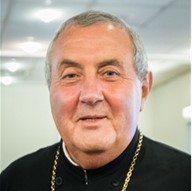Leadership
Rev. Dr Ioan Sauca

Sauca, who currently also serves as deputy general secretary for the WCC programme on Ecumenical Formation and director of the Ecumenical Institute at Bossey, will hold the acting general secretary post until the WCC central committee takes further steps in selection of the next general secretary, following the departure 31 March 2020 of Rev. Dr Olav Fykse Tveit.
Sauca, a priest of the Orthodox Church in Romania, has served as Professor of Missiology and Ecumenical Theology at Bossey since 1998 and as its director since 2001. He has served as a WCC deputy general secretary since 2014. In that capacity, he oversees a variety of WCC programmes in the areas of unity, mission, ecumenical relations, youth, interreligious dialogue and cooperation, worship and spirituality, as well as ecumenical formation.
Sauca first joined the WCC in 1994 as executive secretary for Orthodox Studies and Relationship in Mission. Prior to joining the WCC, he taught mission and ecumenism at the faculty of theology in Sibiu, Romania, and later served his patriarchate as head of the newly established Department of Press and Communication, with additional responsibility for the Department for External and Ecumenical Church Relations and of religious education in public schools.
Sauca studied in the Theological Faculties in Sibiu and Bucharest, Romania, and earned his Ph.D. in Theology at the University of Birmingham, UK, with a dissertation on “The Missionary Implications of Eastern Orthodox Ecclesiology.” He is also an alumnus of the Graduate School at the Ecumenical Institute in Bossey.
While his publications in five languages range across the theological loci, from mission to Christology, ecclesiology and its inner relation to eschatology, they centre on what he has called “the ecumenical vocation of Orthodoxy” and Orthodox contributions to ecumenism. An early publication, Orthodoxy and Cultures, probed the relationship of the gospel to cultures (1996), while a later one, edited with Tim Grass, explored prospects for Building Bridges: Between the Orthodox and Evangelical Traditions (2012).
As director of the institute, Fr Sauca has overseen a closer partnership with the University of Geneva by reshaping the faculty and study plans in light of academic standards, which led to the academic accreditation of its postgraduate courses. To equip students with biblical, theological, and spiritual knowledge to live out and witness to the Christian faith in the multi-faith and multicultural societies of our times, he has also initiated the revision of the institute’s curriculum, expanding it with interreligious offerings, and has encouraged students to engage in the “dialogue of identities” and cooperation among Christians and people of other faiths.
While his own identity is strongly rooted in Orthodox Christianity, Fr Sauca has unflaggingly championed the institute as the premier ecumenical laboratory, in which students undergo life-changing experiences of ecumenical community, encountering the gifts of other Christian traditions and spiritual practices in an atmosphere of respect and openness.